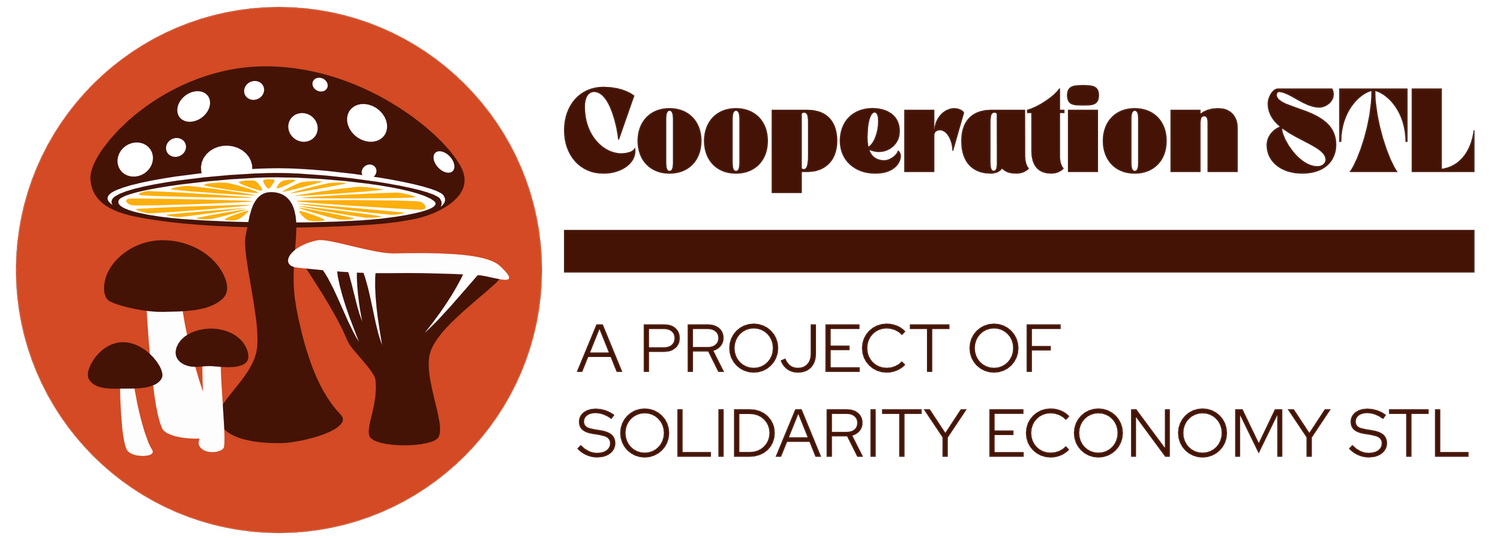IN THIS LESSON
Cooperatives are a framework for organizing our communities.
Read on to learn about different types of cooperatives and why members of the St. Louis community have chosen this framework.
A cooperative (co-op) is…
a self-governing group of people who voluntarily work together to meet their common economic, social, and cultural needs and aspirations through a jointly-owned and democratically-controlled model of orgzanization.
Member-owned
Every member of a cooperative collectively owns it. This means they have contributed some kind of investment in the cooperative. Each cooperative defines membership differently, so this investment could be capital, time, etc (see page 36 for more about membership).
In a housing cooperative, for example, every resident owns the building by contributing to the building’s maintenance and equity or mortgage.
Member-controlled
In cooperatives, all members have an equal say in how the cooperative operates. Decision-making models vary (see page 48), but to be a cooperative, all members must have a say in the major policies of the cooperative.
For example, all worker self-directed non-profit guide the direction of the work.
Member-benefitting
All members of a cooperative have access to its benefits, such as housing, goods, profit, amenities, etc.
In a worker cooperative, all employees share the profits that would otherwise go to shareholders, proprietor, or partners in a traditional business.
What types of co-ops exist?
Reference: “What is a Co-Op?” booklet based on cultivate.coop
Worker co-ops
A business owned & controlled entirely by its workers
Examples: homecare, small manufacturing, bakeries
In STL: Pure Vibes, Garrity Tools
Worker self-directed non-profit
A non-profit where all workers manage programs and the organization as a whole.
In STL: HOSCO
Multi-stakeholder co-ops
Owned by multiple types of members
Examples: A grocery store that is owned and managed by both staff and customers.
In STL: HOSCO
Purchasing or retail co-ops
Independently owned businesses that collectively purchase goods and services at lower rates
In STL: Do it Best Hardware Stores
Consumer co-ops
An enterprise owned and governed by its consumers.
Examples: groceries, health care, electrical or telephone service
Housing co-ops
A Residential property owned and maintained collectively by its residents.
In STL: Hidden Alley Ranch
Producer co-ops
Organizations formed by producers of similar goods to sell them collectively
Examples: dairy, craftspeople
In STL: Prairie Farms
Credit union
A consumer-owned financial services cooperative in which every depositor becomes a member-owner
In STL: STL Community Credit Union

“No one structure is the best structure. There needs to be more information out there about how people can develop a co-op that fits their mission.“
- Gibron Jones, HOSCO
There are many reasons people start cooperatives!
Check out these insights from our community. Then, download the worksheet and brainstorm your own.
“We need to create a model for a different way of being, and give life to it and feed it so it can essentially displace capitalism as a modality because of its success.”
“Something that sets cooperatives apart is an overarching value of mutual benefit, not one person extracting profit, not the exploitation of workers for the benefit of the few, not creating a product that only some people can access. There’s always this consideration of mutual benefit between the workers, patrons, community and environment.”
“The shifts in social justice and our culture since 2019 and the pandemic have really opened my eyes. I decided that I wanted to be impactful in a way that’s not just creating jobs. ”
“We were looking for something that was not a capitalist, western-oriented free enterprise…. We weren’t looking to imitate a system that was not to our benefit. ”
“I didn’t like a lot of things that business does, that capitalism does, and I wanted to see if there was a different way of doing it. A different structure that might fix some of the problems. ”
“It just makes more sense to get people’s input and give them a vested interest in the organization. The whole focus of corporate America is to funnel all of the capital to the owners at the top....In a co-op, the people are in charge.”


